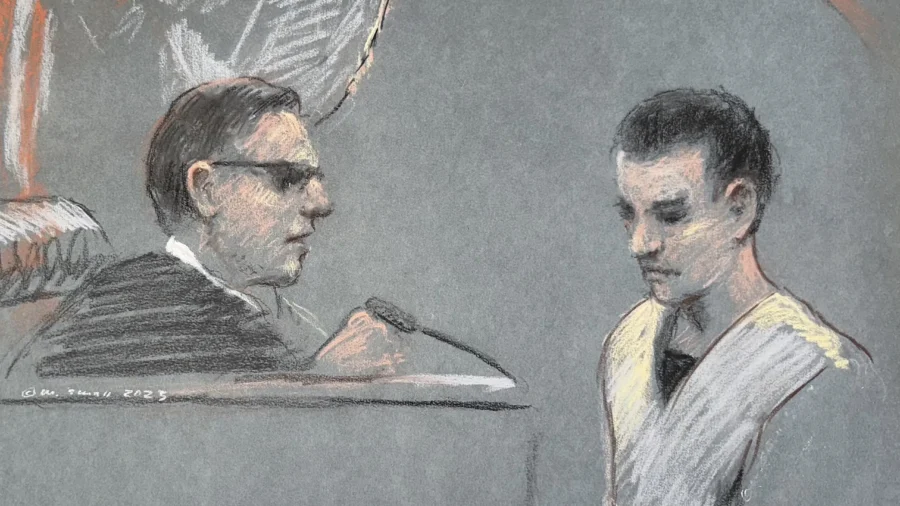Massachusetts Air National Guardsman Jack Teixeira pled guilty on March 4 to leaking a trove of U.S. military planning documents, including documents about the ongoing war between Russia and Ukraine.
Mr. Teixeira, 22, initially pled not guilty after being arrested and charged with the leak last year.
Appearing before a federal court in Boston, his lawyers motioned for a change in plea, announcing that he would admit guilt to six counts for the willful retention and transmission of national defense information.
In exchange for his guilty plea, the U.S. Department of Justice has agreed not to further charge Mr. Teixeira with Espionage Act violations.
Mr. Teixeira’s defense team and federal prosecutors also agreed that he should face 132 to 200 months in prison, a term ranging from 11 years to about 16 years and eight months.
The deal calls for Mr. Teixeira to pay an additional $50,000 fine and undergo 36 months of supervised release following his prison term.
Appearing in court on March 4, Mr. Teixeira admitted to illegally collecting military secrets and sharing them with other users on Discord, a social messaging platform popular in the online gaming community.
The sensitive military documents were originally posted on a Discord server dubbed “Thug Shaker Central” and the earliest posts on the server may go as far back as October 2022.
The leaks garnered increased national attention in April 2023 as they were reshared on other social media platforms like Twitter, Telegram, and the 4Chan online message board.
Investigators believe Mr. Teixeira gained access to the sensitive military documents while assigned as a cyber transport systems specialist with the 102nd Intelligence Wing at Otis Air National Guard Base in Massachusetts.
The investigators say Mr. Teixeira first typed out classified documents he accessed and then began sharing photographs of files that bore SECRET and TOP SECRET markings.
Some documents posted online appeared to describe military equipment donated to Ukraine’s military by the United States and other nations. Other documents appeared to reference training timelines for Ukrainian forces, as well as casualty assessments and equipment losses from the fighting.
Among the leaked documents was one mentioning a 2023 “spring offensive” with a reference to “30 April.”
Those references may have alluded to a counteroffensive operation that Ukrainian forces launched in the late spring of 2023. That effort has been widely regarded as a failure, with Ukrainian forces struggling to break through layers of Russian defensive lines in the country’s east.
The full extent of the document leak is unclear. As part of his plea agreement, Mr. Teixeira must participate in a debrief with members of the intelligence community, the Defense Department, and the Justice Department.
Teixeira’s Unit Punished for Security Lapses
The U.S. Air Force’s Office of Inspector General began investigating Mr. Teixeira’s unit shortly after his arrest in April. The Air Force assigned the 102nd Intelligence Wing’s responsibilities to other units and suspended unit leaders as this investigation played out.
The Air Force Inspector General’s team uncovered accounts of Mr. Teixeira engaging in questionable behavior regarding classified information, including information marked Top Secret and Sensitive Compartmented Information (TS/SCI).
Throughout the summer and fall of 2022, Mr. Teixeira and other IT specialists within his unit were reportedly permitted to sit in on weekly intelligence briefings to impress upon them the importance of their role in keeping classified IT systems running.
The IG report says this “know your why” effort was improper because it provided a higher level of access to classified information than was necessary for Mr. Teixeira and the other IT specialists to understand their mission. It also created ambiguity about whether their access to this information was proper.
During this time, Mr. Teixeira was observed viewing TS/SCI materials on multiple occasions, the inspector general’s report alleges.
On Sept. 15, 2022, a member of Mr. Teixeira’s unit allegedly saw him writing on a post-it note while looking at sensitive military documents. A member of the unit confronted him about his note-taking and told him to shred the note.
However, what he’d allegedly written was never verified or whether it was shredded as ordered.
In another Oct. 25, 2022 intelligence briefing, Mr. Teixeira is alleged to have asked detailed questions that suggested a knowledge of existing TS/SCI materials.
When confronted about his line of inquiry, he acknowledged that his questions overlapped with classified materials but insisted the same information was available through “open sources.”
Despite his claims, the inspector general asserts that it was unlikely that the matters Mr. Teixeira referenced were based on public information.
Mr. Teixeira was ordered to “cease and desist” his intelligence “deep dives” following this October 2022 incident, which was documented in a Memorandum for Record but never reported to the proper security officials, according to the inspector general.
At It Again in January
Mr. Teixeira reportedly was caught viewing intelligence documents again in January, and senior unit leaders were notified of that and other incidents involving the airman.
This incident did prompt unit leaders to notify security officials. But those unit leaders still provided “a substantially minimized version” of Mr. Teixeira’s concerning behavior, the inspector general’s report said.
The Air Force made the inspector general’s report public last year and announced disciplinary action against 15 unit leaders in December. Those 15 individuals disciplined for the leaks were mid-level enlisted airmen to senior field-grade officers.
Disciplinary actions ranged from relief of command and other duty positions to nonjudicial punishments.
Col. Sean Riley, commander of the 102nd Intelligence Wing, received an adverse administrative action and was relieved of command for cause, according to the Air Force press statement.
Col. Enrique Dovalo, commander of the 102nd Intelligence, Surveillance, and Reconnaissance Group, received an adverse administrative action over concerns with unit culture and compliance with policies and standards.
The Associated Press contributed to this article.


